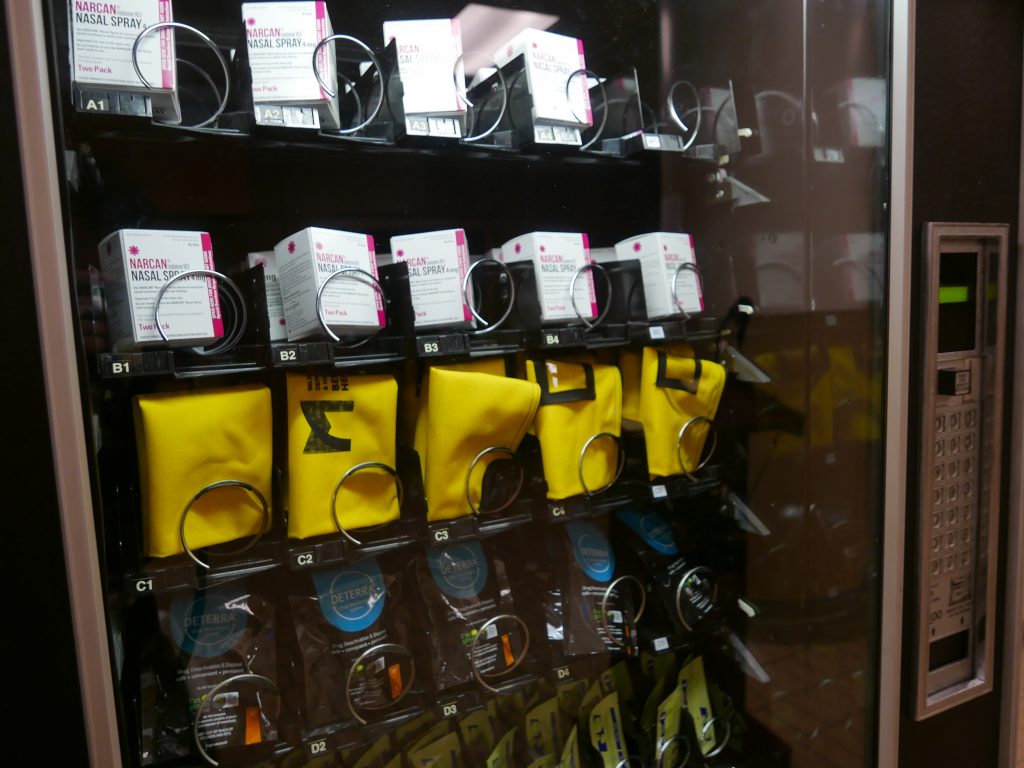Crowley Promotes Vending Machines To Prevent Opioid Deaths
County to install 25 vending machines with narcan spray, fentanyl test strips and more.
Milwaukee County Executive David Crowley officially signed off on $11.8 million in funding for a slate of programs targeting the opioid epidemic and its deadly fallout. The press conference Monday morning announcing this also included the unveiling of a vending machine which will be a key part of the county’s strategy to prevent opioid deaths
The funding comes from a $71 million settlement between the county and several drug manufacturers and distributors. The county, along with dozens of other state and local governments, sued McKesson Corporation, Cardinal Health, Inc., Johnson & Johnson, AmerisourceBergen Corporation, Janssen Pharmaceuticals, Inc. and Ortho-McNeil-Janssen Pharmaceuticals, Inc. The settlement funds are being paid to the county in installments over 15 years.
The funds are bolstering a number of existing programs run by the county’s Department of Health and Human Services (DHHS) and creating new ones. They range from a medication-based treatment program for people in custody at the county’s Community Reintegration Center (CRC) to new harm reduction vending machines.
These machines were the highlight of the press conference, where the first of many to come was placed at the Marcia P. Coggs Human Services building, 1220 W. Vliet St.
Jeremy Triblett, prevention coordinator for the county’s Behavioral Health Division, explained that the vending machines contain nasal narcan spray, medication lock bags, fentanyl test strips, gun locks and drug deactivation bags.
The nasal narcan spray is a medication that reverses the effects of an opioid overdose. Drug deactivation bags are what they sound like, and can be used by placing pills or liquid medication in the bag and then, Triblett explained, “add water, shake it up, and put it in your garbage can.” Fentanyl test strips, which only recently became legal in Wisconsin, test for the presence of the deadly synthetic opioid that is, according to Dr. Ben Weston, county chief health policy advisor, the cause of 95% of overdose deaths in Milwaukee County.
The first 11 vending machines will go out this year, and 25 total will eventually be placed throughout the county, Triblett said. The county has 15 organizations that have signed up to host one, he said, and it’s looking for more. “That includes libraries, that includes churches, that includes restaurants,” Triblett said.
“We are targeting all spaces and places with all demographics,” he said, adding that some areas do experience more overdose deaths per-capita and the county may find it needs to put more vending machines in certain locations. DHHS is “watching the project very closely” and will make any changes necessary to improve it, he said, including additional technology or public campaigns targeting specific populations.
“The harm reduction vending machines are an important first step in deploying opioid settlement funds to prevent death from overdose,” Crowley said in a statement. “I am hopeful the many projects funded by the opioid settlement will have a significant impact, and I welcome the community partners who will be joining us in our efforts to save lives.”
In Milwaukee County, there is an opioid overdose death every 16 hours on average, Dr. Weston said. “While we can and are working upstream to prevent these overdoses before they occur. So to is it important to work on harm reduction, minimizing the adverse effects of opioid use in our county.”
Along with the vending machines and other projects, Crowley signed off on $1.4 million in funding for grants available to community organizations that are also working on the opioid epidemic. “We are granting settlement funds to community-based organizations to increase our capacity and expand our efforts already proven to be effective,” said Shakita LaGrant-McClain, director of DHHS. The grant opportunity will be advertised in April for potential community partners.
Sup. Priscilla E. Coggs-Jones said she thought it was appropriate that the first vending machine be placed in the building which is named for her grandmother. “Given her legacy, and fighting for social justice and equality, I like to think she’d be extremely proud of the work done here today,” she said.
Update: This story has been updated to reflect that Sup. Coggs does not represent the area of the Coggs building. The building falls within Chairwoman Marcelia Nicholson’s district.
More about the Opioid Crisis
- Menominee Tribe Has 70% Decline in Overdose Deaths, Hospitalizations - Joe Schulz - Nov 27th, 2024
- Serenity Inns: A Proven Lifesaving Facility Denied Critical State Funding - Serenity Inns - Nov 19th, 2024
- Milwaukee County Outreach Team Going Door-to-Door Handing Out Narcan in High Overdose Areas - Evan Casey - Nov 14th, 2024
- DHS Launches New System to Help Communities Track and Respond to Overdose - Wisconsin Department of Health Services - Nov 14th, 2024
- Attorney General Kaul and Bipartisan Coalition of 30 States Announce Settlement with Kroger Over Opioid Crisis - Wisconsin Department of Justice - Nov 6th, 2024
- Baldwin Calls on Biden Administration to Investigate China’s Role in Fueling the Fentanyl Crisis - U.S. Sen. Tammy Baldwin - Oct 23rd, 2024
- Baldwin Brings Home $750,000 for Northeastern Wisconsin to Combat Fentanyl and Opioid Epidemic - U.S. Sen. Tammy Baldwin - Sep 27th, 2024
- AG Kaul Meets with EMS Leave Behind Program Recipients - Wisconsin Department of Justice - Sep 17th, 2024
- MKE County: Crowley Signs Opioid Program Funding - Graham Kilmer - Sep 10th, 2024
- Serenity Inns Opens New Addiction Treatment Center in Milwaukee - Serenity Inns - Aug 14th, 2024
Read more about Opioid Crisis here
Political Contributions Tracker
Displaying political contributions between people mentioned in this story. Learn more.
MKE County
-
RNC Will Cause Some County Services To Be Moved to Wauwatosa
 Jul 12th, 2024 by Graham Kilmer
Jul 12th, 2024 by Graham Kilmer
-
Hank Aaron State Trail Will Be Closed For RNC, State Fair
 Jul 12th, 2024 by Graham Kilmer
Jul 12th, 2024 by Graham Kilmer
-
MCTS Designing New Bus Shelters
 Jul 10th, 2024 by Graham Kilmer
Jul 10th, 2024 by Graham Kilmer






















Why spend money on a vending machine ?most addicts will
Not spend time looking for a vending machines.. the foolishness continues .The feel good rally wins again while taxpayers pick up the tab time to leave .